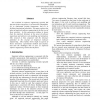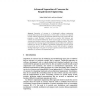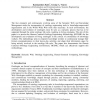3514 search results - page 87 / 703 » Evolving Specification Engineering |
APSEC
2002
IEEE
14 years 28 days ago
2002
IEEE
Our activities in software engineering typically fall into one of three categories, (1) to invent new phenomena, (2) to understand existing phenomena, and (3) to facilitate inspir...
WCRE
1999
IEEE
14 years 6 days ago
1999
IEEE
As a program evolves, it becomes increasingly difficult to understand and reason about changes in the source code. Eventually, if enough changes are made, reverse engineering and ...
JISBD
2003
13 years 9 months ago
2003
Separation of concerns is a fundamental software engineering principle that proposes the encapsulation of each matter of interest in a separate module. Software engineering develop...
KAIS
2006
13 years 8 months ago
2006
The fast emergent and continuously evolving areas of the Semantic Web and Knowledge Management make the incorporation of ontology engineering tasks in knowledge-empowered organiza...
HICSS
2006
IEEE
14 years 2 months ago
2006
IEEE
The focus of this paper is to introduce a comprehensive model for assessing and improving the maturity of Collaboration Engineering (CE) processes. The model is targeted at introd...



